Are you ready to embark on a journey with a breed that is as versatile as it is loyal? Look no further than the German Shorthaired Pointer.
With their hunting skills deeply ingrained in their DNA, these dogs are as sharp as an arrow when it comes to tracking and retrieving. But what sets them apart is their ability to seamlessly transition from a hunting companion to a beloved family member.
Curious to learn more about these remarkable canines? Join us as we uncover the secrets of the German Shorthaired Pointer – their history, characteristics, and the perfect home they seek.
Key Takeaways
- German Shorthaired Pointers are versatile hunting dogs, known for their tracking, retrieving, and hunting skills. They are also excellent family companions and can participate in competitive field trials.
- When choosing a German Shorthaired Pointer, it is recommended to prioritize adoption from rescue organizations or shelters. If opting for a breeder, thorough research is necessary to find a reputable breeder who follows ethical practices and conducts health and temperament screenings.
- German Shorthaired Pointers can adapt to apartment living, but factors such as size, energy levels, good manners, and polite behavior should be considered. They have a tendency to wander and may require a leash or a secure area. Their tendency to bark or howl should also be considered for noise-restricted areas.
- German Shorthaired Pointers have high exercise needs and require regular physical and mental stimulation. They are known for their playfulness and can be compatible with various lifestyles and other pets if properly trained and socialized.
Origin and Purpose
The German Shorthaired Pointer, known for its origins in Germany and its purpose as a hunting dog, is a highly versatile and skilled breed.
Developed in the 19th century, it was bred to be a multipurpose hunting dog capable of locating and retrieving game on both land and water. The breed's origins can be traced back to several German breeds, including the Spanish Pointer, the English Pointer, and the Hannover Hound. This combination created a dog with exceptional scenting ability, intelligence, and endurance.
The German Shorthaired Pointer's purpose as a hunting dog is reflected in its athletic build, with a sleek, muscular body built for speed and agility. Its webbed feet and water-resistant coat make it an excellent swimmer, while its keen nose and sharp eyesight allow it to track and locate game in various terrains.
Whether in the field or in the water, the German Shorthaired Pointer is a dedicated and reliable hunting companion.
Physical Characteristics
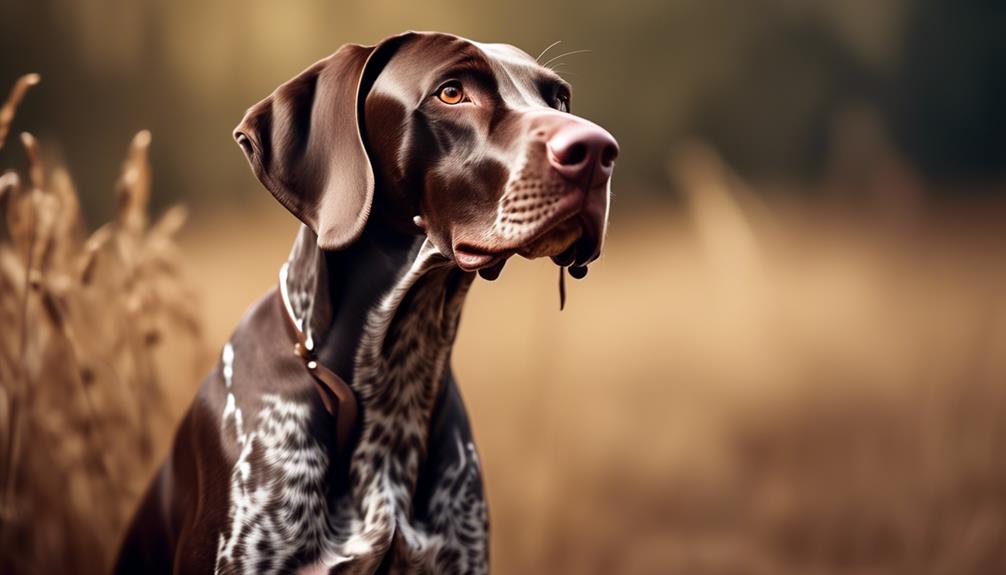
After exploring the origins and purpose of the German Shorthaired Pointer as a highly versatile hunting dog, let's now dive into its physical characteristics.
- Size: German Shorthaired Pointers are medium to large-sized dogs, with males standing between 22-25 inches and females between 21-23 inches at the shoulder.
- Weight: They typically weigh between 55-70 pounds for males and 45-60 pounds for females.
- Coat: The GSP has a short and dense coat that provides protection in various weather conditions. It comes in a variety of colors and patterns, including liver, black, and white, liver and white, and black and white.
These physical characteristics make the German Shorthaired Pointer well-suited for its hunting and retrieving purposes. Their size allows them to cover ground efficiently, while their short coat helps them move easily through different terrains. Additionally, their coat colors provide camouflage during hunting activities.
Lifespan and Renowned Roles
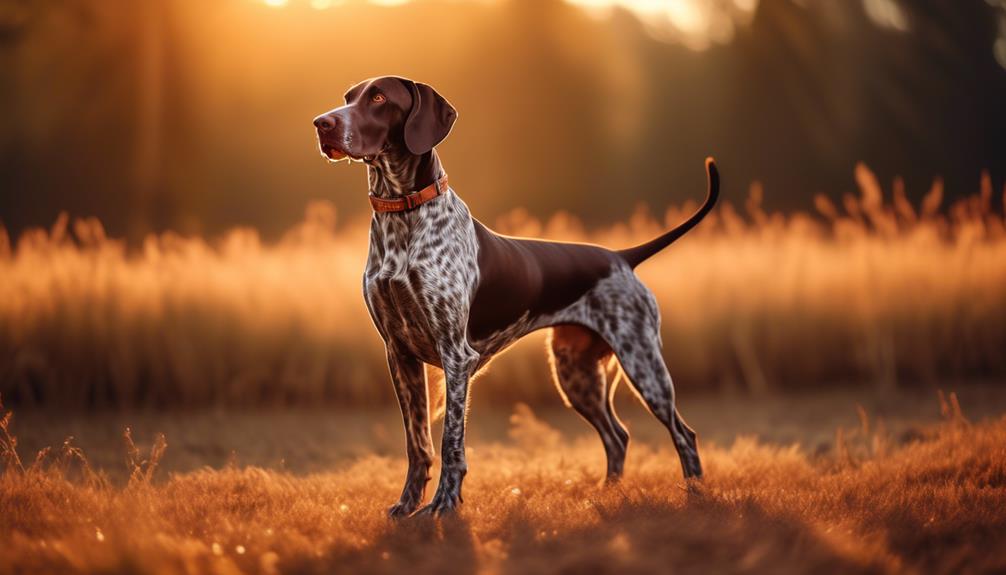
With a lifespan of 12-14 years, the German Shorthaired Pointer excels in a variety of renowned roles, showcasing its versatility and adaptability in the hunting field, tracking endeavors, competitive field trials, and as a trusted family companion.
As a hunting dog, the German Shorthaired Pointer possesses exceptional scenting abilities, speed, and endurance, making it an ideal partner for game retrieval. Their keen sense of smell and determination make them highly proficient in tracking tasks, whether it be for finding lost individuals or locating specific items.
Additionally, their intelligence and trainability enable them to excel in competitive field trials, where they're evaluated on their ability to perform tasks such as pointing, retrieving, and obedience.
Despite their working capabilities, German Shorthaired Pointers also make excellent family companions, thanks to their friendly and affectionate nature. They're known for forming strong bonds with their human families and are often gentle and patient with children.
Adoption and Breeding Considerations

Continuing our discussion on the German Shorthaired Pointer, let's now turn our attention to the important considerations when it comes to adopting and breeding this versatile hunting breed.
When it comes to adopting a German Shorthaired Pointer, there are a few key factors to keep in mind:
- Prioritize adopting from rescue organizations or shelters, as there are many GSPs in need of loving homes.
- Conduct thorough research to find a reputable breeder who follows ethical practices and prioritizes the health and temperament of their dogs.
- Ensure that the breeder conducts health and temperament screenings to minimize the risk of genetic health issues and ensure a well-rounded companion.
Breeding a German Shorthaired Pointer also requires careful consideration:
- It's important to have a comprehensive understanding of the breed standard and the specific traits and characteristics that make a good breeding candidate.
- Breeding should only be done with the intention of improving the breed and preserving its hunting abilities.
- Responsible breeders will ensure that both the male and female dogs have undergone health screenings and possess sound temperaments, ensuring that the puppies have the best chance of a healthy and well-balanced life.
Taking these considerations into account will help ensure the welfare and longevity of the German Shorthaired Pointer breed.
Health and Temperament Screening

To ensure the health and temperament of German Shorthaired Pointers, it's crucial to conduct thorough screenings and assessments.
Regular veterinary check-ups are essential to monitor their overall health and identify any potential issues early on.
Key health screenings for this breed include hip and elbow evaluations, as well as eye examinations to check for conditions such as cataracts and progressive retinal atrophy.
In addition, it's important to assess their temperament through behavioral evaluations, which can help identify any potential aggression or anxiety issues.
German Shorthaired Pointers should also undergo genetic testing for inherited diseases such as von Willebrand's disease and epilepsy.
Nurturing Environment for Puppies

To provide a nurturing environment for German Shorthaired Pointer puppies, establishing a solid foundation of care and socialization is paramount. This breed thrives in an environment that fosters their physical, mental, and emotional growth. Here are three key elements to consider:
- Consistent Training: Start early with basic obedience training, focusing on commands such as sit, stay, and come. Use positive reinforcement techniques, such as treats and praise, to encourage good behavior.
- Socialization: Expose your puppy to various environments, people, and animals to help them become well-rounded and confident. Gradually introduce them to new experiences, including different sounds, surfaces, and situations.
- Mental Stimulation: Provide your puppy with interactive toys, puzzle games, and training exercises to keep their minds engaged. Engaging in activities like scent work or agility training can also help satisfy their natural instincts.
Adaptability to Apartment Living

German Shorthaired Pointers display impressive adaptability to apartment living due to their moderate size, energy levels, and good manners. Despite their hunting background, these dogs can thrive in smaller living spaces as long as their exercise needs are met. Here is a breakdown of their adaptability factors in a table format:
| Adaptability Factors | Description |
|---|---|
| Size | German Shorthaired Pointers are medium-sized dogs, making them suitable for apartments. |
| Energy Levels | While they have high energy levels, regular exercise can help them adapt to apartment life. |
| Good Manners | These dogs are known for their good manners and polite behavior, making them ideal for apartment living. |
With their moderate size, German Shorthaired Pointers can comfortably maneuver within an apartment. Their energy levels can be managed through daily exercise, such as long walks or energetic games. Additionally, their good manners and polite behavior make them well-suited for apartment living. However, it is crucial to provide them with regular physical and mental stimulation to keep them happy and content.
Factors to Consider for Apartment Living

When considering apartment living with a German Shorthaired Pointer, it's important to take into account several factors to ensure a harmonious living environment. Here are some key considerations:
- Size: German Shorthaired Pointers are medium to large-sized dogs, so make sure your apartment can comfortably accommodate their size.
- Energy Levels: These dogs have high energy levels and require regular exercise. Ensure that you can provide them with sufficient physical activity to prevent boredom and destructive behavior.
- Good Manners and Polite Behavior: German Shorthaired Pointers need proper training and socialization to develop good manners and polite behavior. This is essential for apartment living to avoid disturbances to neighbors.
Aggression, Fear, and Leash Training
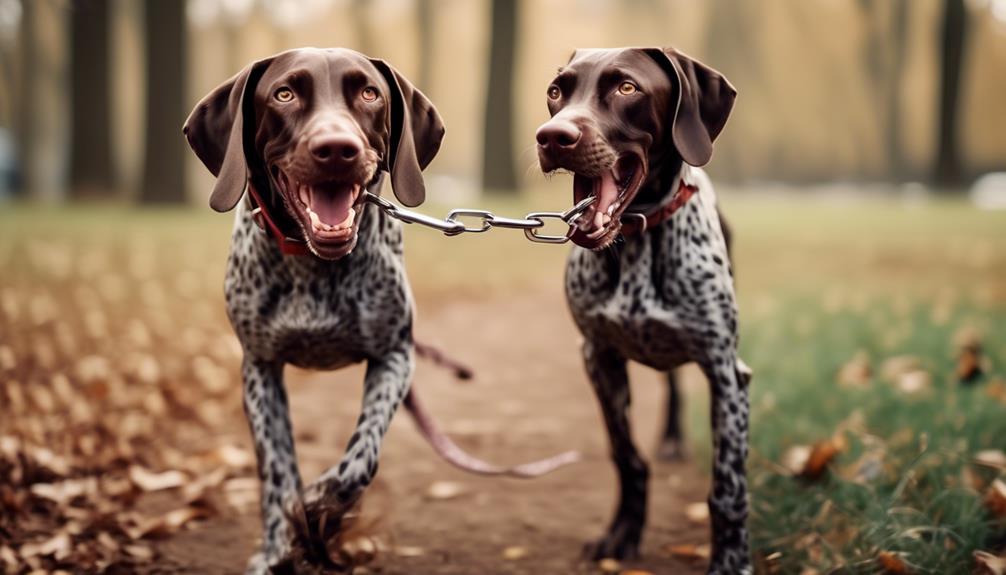
Are you struggling with aggression, fear, or leash training with your German Shorthaired Pointer?
It's important to address these issues early on to ensure a well-behaved and happy dog.
Aggression in German Shorthaired Pointers can be a result of fear, dominance, or inadequate socialization. To address aggression, it's crucial to consult with a professional dog trainer who specializes in positive reinforcement techniques.
Fear, on the other hand, can be caused by lack of exposure to different environments, people, and animals. Gradual desensitization and counterconditioning can help your dog overcome their fears.
Leash training is essential for the safety and control of your German Shorthaired Pointer. Start with short sessions, using positive reinforcement to reward good behavior. Consistency, patience, and proper techniques will help you establish a strong and enjoyable walking routine with your furry friend.
Barking, Howling, and Noise Restrictions
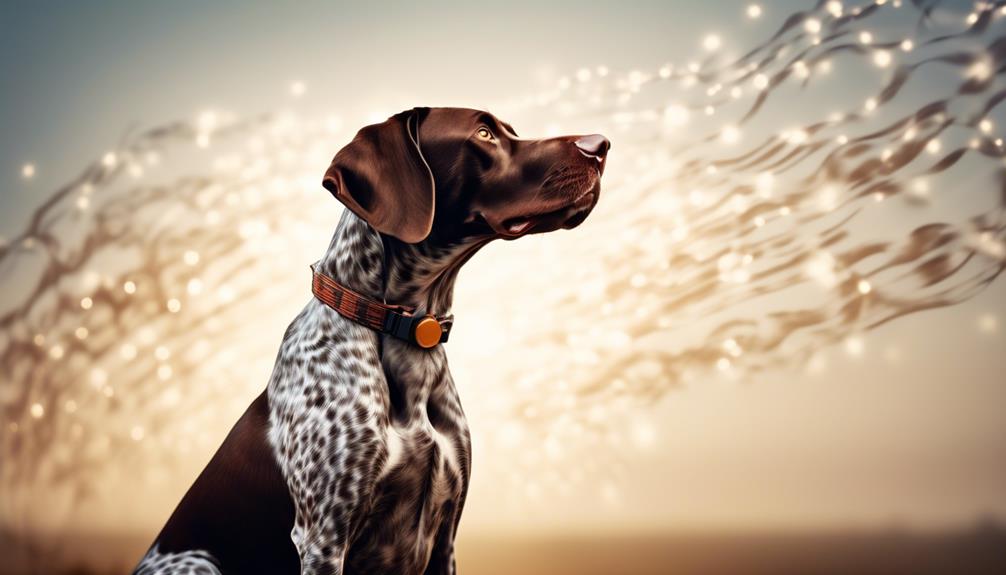
To address barking, howling, and noise restrictions with your German Shorthaired Pointer, it's important to understand the underlying reasons for these behaviors and implement appropriate training techniques. GSPs are known for their vocal nature and may bark or howl to communicate, express boredom, or alert their owners. To manage these behaviors effectively, consider the following:
- Identify triggers: Determine what causes your GSP to bark or howl, such as strangers, other animals, or separation anxiety.
- Provide mental and physical stimulation: Engage your GSP in regular exercise and mental enrichment activities to prevent boredom and reduce excessive barking or howling.
- Positive reinforcement training: Use positive reinforcement techniques, such as rewards and praise, to encourage your GSP to remain calm and quiet in certain situations.
Exercise Needs and Mental Stimulation
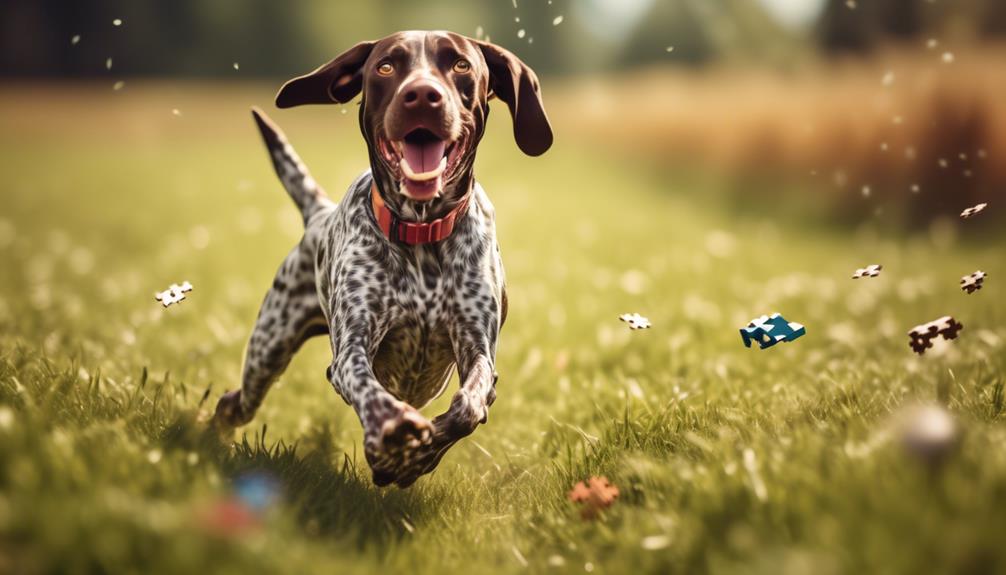
Exercise is a crucial aspect of caring for a German Shorthaired Pointer. These dogs are highly energetic and have a strong hunting instinct. They require regular physical activity and mental stimulation to thrive. It's important to provide them with outlets for their energy.
Daily exercise should include at least one hour of vigorous activity. This can be achieved through long walks, hikes, or energetic games.
Mental stimulation is equally important for this intelligent breed. Engage their minds with puzzle toys, obedience training, and interactive play sessions. GSPs excel in activities such as agility, tracking, and retrieval. These activities provide both physical and mental challenges.
Neglecting their exercise and mental stimulation needs can lead to behavioral problems. These problems may include excessive barking, destructiveness, or hyperactivity.
Therefore, it's crucial to prioritize regular exercise and mental enrichment to ensure the overall well-being of your German Shorthaired Pointer.
Playfulness and Compatibility With Lifestyle
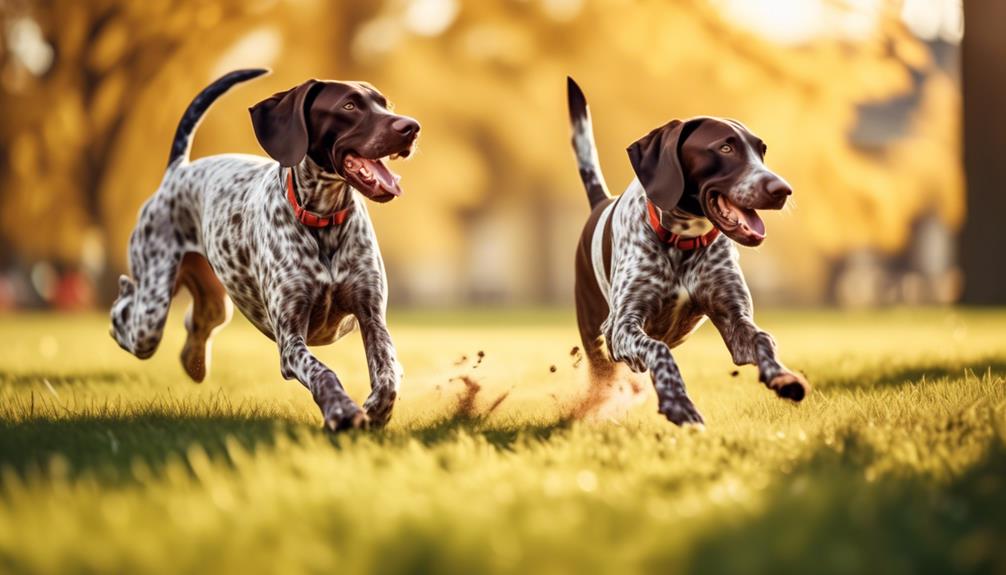
Playfulness and compatibility with lifestyle are essential factors to consider when bringing a German Shorthaired Pointer into your home. This breed is known for its energy and love for play, so it's important to ensure that you have a lifestyle that aligns with their needs. Here are some key points to consider:
- Active Lifestyle: German Shorthaired Pointers thrive in an active environment. They require regular exercise, such as long walks, energetic games, and strenuous hikes. This breed isn't suitable for a sedentary lifestyle.
- Mental Stimulation: Along with physical exercise, mental stimulation is crucial for the well-being of a German Shorthaired Pointer. They're intelligent dogs that enjoy challenges and learning new things. Consider activities such as puzzle toys, obedience training, and interactive play.
- Compatibility: German Shorthaired Pointers are generally friendly and adaptable. They can fit into various lifestyles, including families with children or active individuals. However, it's important to ensure that your home and daily routine can accommodate their exercise and mental stimulation needs.
GSP History and Popularity
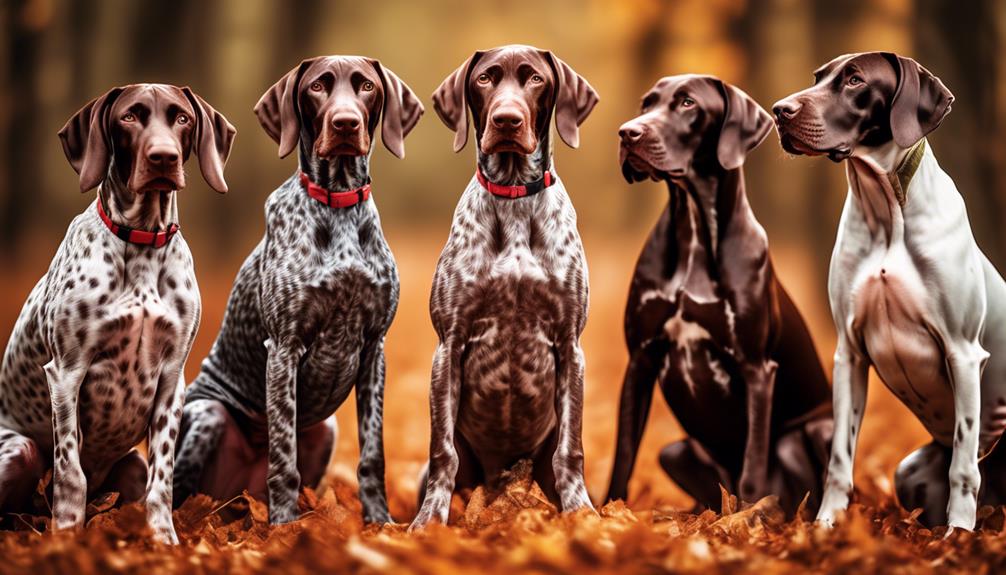
German Shorthaired Pointers have a rich history and have gained significant popularity as versatile hunting companions and family pets. The breed originated in Germany and was developed to be an all-purpose hunting dog. They excel in tracking, retrieving, and competitive field trials. With a height of 22-25 inches for males and 21-23 inches for females, and weighing between 55-70 pounds for males and 45-60 pounds for females, GSPs are medium-sized dogs. They have a lifespan of 12-14 years and are known for their intelligence, friendliness, eagerness to please, confidence, and strong bonds with their families. In terms of health, GSPs may be prone to certain conditions such as hip dysplasia and bloat. In terms of popularity, German Shorthaired Pointers are currently ranked 9th among all AKC recognized breeds. They were first recognized by the AKC in 1930 and have since gained a loyal following in the United States. The table below provides a summary of the breed's history and popularity.
| GSP History and Development | Popularity and Ranking |
|---|---|
| – Originated in Germany | – Currently ranked 9th |
| – Developed for hunting | – Recognized by AKC in 1930 |
| – All-purpose hunting dog | – Gained popularity in the United States |
Size, Personality Traits, and Health Considerations
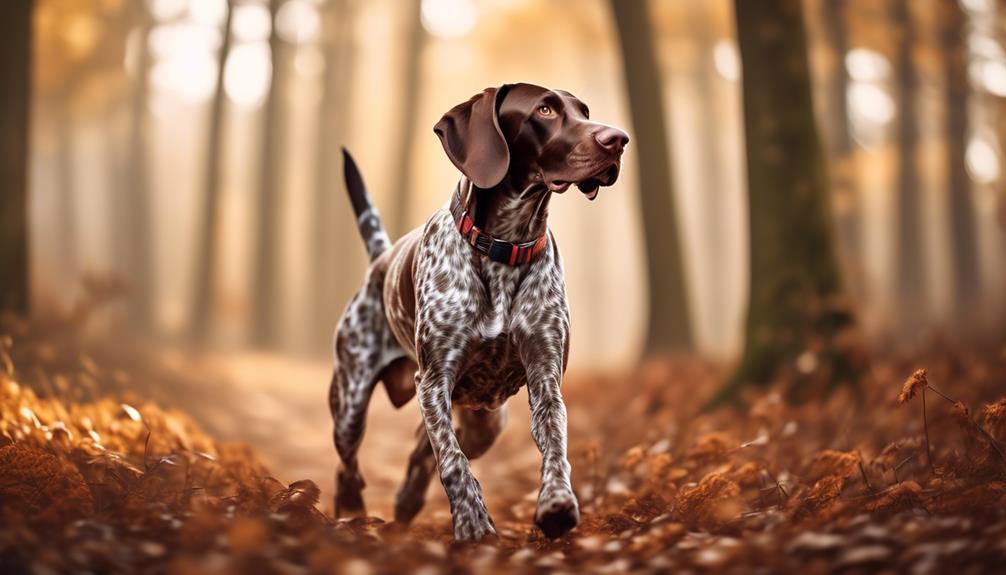
When considering the German Shorthaired Pointer, it's important to understand their size, personality traits, and health considerations.
Size: German Shorthaired Pointers are medium to large-sized dogs. Males typically stand between 22-25 inches tall at the shoulder and weigh 55-70 pounds, while females stand between 21-23 inches tall and weigh 45-60 pounds.
Personality Traits: These dogs are known for their intelligence, friendliness, eagerness to please, confidence, and strong bonds with their family. They make excellent hunting companions and excel in various activities such as tracking and retrieving. They're also great family pets and can participate in competitive field trials.
Health Considerations: Like all dog breeds, German Shorthaired Pointers are prone to certain health conditions. Common issues include hip dysplasia, bloat, and certain eye diseases. Regular veterinary check-ups, a balanced diet, and regular exercise are crucial for maintaining their overall health and well-being.
Ideal Home Environment and Care Requirements
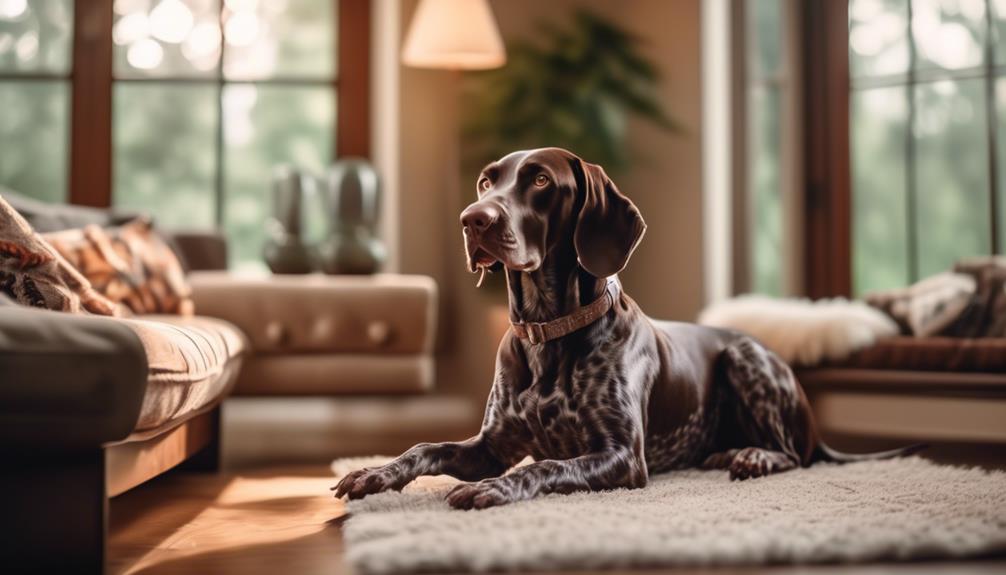
What is the ideal home environment and care requirements for a German Shorthaired Pointer?
German Shorthaired Pointers thrive in active households with individuals who can provide them with plenty of exercise and mental stimulation. They require at least one hour of exercise per day, which can include strenuous hikes, long walks, and energetic games. A spacious yard is beneficial for them to burn off their energy.
Crate training is recommended for young GSPs to ensure their safety and prevent destructive behavior. Kindness, consistency, and positive reinforcement are key in training these intelligent and eager-to-please dogs.
When it comes to feeding, they require 2 to 3 cups of high-quality dry food divided into two meals, with variations based on size, age, metabolism, and activity level. Grooming includes regular brushing of their short and dense coat, occasional baths, and attention to their feet and ears.
It's important to supervise interactions between GSPs and children, and early socialization is crucial to prevent potential aggression towards same-sex dogs.
Frequently Asked Questions
Are German Shorthaired Pointers Good With Children and Other Pets?
German Shorthaired Pointers are generally good with children and other pets due to their friendly and sociable nature. However, it is important to supervise interactions, provide education on handling, and ensure early socialization for a harmonious and safe environment.
How Often Should a German Shorthaired Pointer Be Groomed?
You should groom your German Shorthaired Pointer regularly to keep their short and dense coat in good condition. This helps prevent matting, removes loose hair, and keeps them looking their best.
What Are Some Common Health Conditions in German Shorthaired Pointers?
Some common health conditions in German Shorthaired Pointers include hip dysplasia, elbow dysplasia, bloat, ear infections, and eye issues. Regular vet check-ups, proper diet, exercise, and grooming can help prevent and manage these conditions.
How Much Exercise Does a German Shorthaired Pointer Need on a Daily Basis?
You should give your German Shorthaired Pointer at least one hour of exercise per day. They need strenuous hikes, long walks, and energetic games to stay happy and healthy. Regular exercise is essential for their physical and mental well-being.
What Are Some Reputable Rescue Groups for German Shorthaired Pointers?
There are several reputable rescue groups for German Shorthaired Pointers, such as Mid-Atlantic German Shorthaired Pointer Rescue, NorCal GSP Rescue, GSP Rescue of Wisconsin, German Shorthaired Pointer Rescue Pennsylvania, and The California German Shorthaired Pointer Rescue.
What Are the Key Differences Between German Shorthaired and German Longhaired Pointers?
The German Shorthaired Pointer breed is known for its short coat and versatile hunting skills, while the German Longhaired Pointer breed is prized for its long, flowing coat and gentle temperament. The German Shorthaired Pointer is more energetic and active, while the German Longhaired Pointer is calmer and more affectionate towards its owners.
Conclusion
In conclusion, the German Shorthaired Pointer is the perfect combination of hunting prowess and family companionship. With their versatile skills and loyalty, they make excellent additions to any household.
Whether you're looking for a hunting partner or a loving family pet, the German Shorthaired Pointer is a breed that can fulfill both roles.
So why wait? Discover the joy and excitement of owning a German Shorthaired Pointer and experience the true meaning of a loyal and devoted companion.
They're the 'silver bullet' of the dog world, ready to bring adventure and love into your life.




